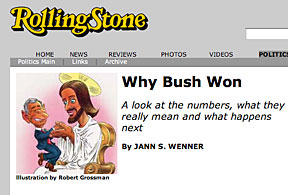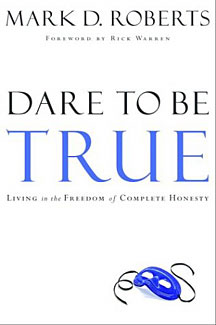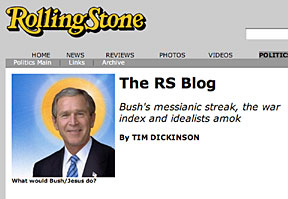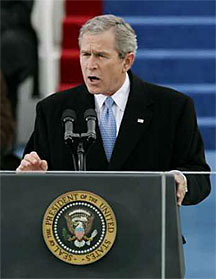| |
A Resource by Mark D. Roberts |
|
A Rolling Stone Gathers No . . . Bible?
by Rev. Dr. Mark D. Roberts
Copyright © 2005 by Mark D. Roberts
Note: You may download this resource at no cost, for personal use or for use in a Christian ministry, as long as you are not publishing it for sale. All I ask is that you give credit where credit is due. For all other uses, please contact me at mark@markdroberts.com. Thank you.
With No Direction Home . . . Like a Rolling Stone
Part 1 of the series “A Rolling Stone Gathers No . . . Bible?”
Posted at 11:00 p.m. on Sunday, January 23, 2005
In 1965 Bob Dylan first released his plaintive song “Like a Rolling Stone.” You may well remember the chorus:
How does it feel
How does it feel
To be on your own
With no direction home
Like a complete unknown
Like a rolling stone.
Forty years later, Rolling Stone magazine finds itself unwilling to offer “direction home” to its readership.
What am I talking about? You may have seen the curious news story that has shown up in papers across the country. The basic story: Rolling Stone magazine recently rejected an ad for a new Bible translation aimed at 18-34 year olds, the kind of people who read Rolling Stone. After first giving approval for the ad in general, Rolling Stone rejected it when they saw the actual ad that was submitted.
Why? It’s a little hard to know exactly why the magazine rejected the ad since Rolling Stone itself has been unwilling to comment. But Kent Brownridge, general manager of Wenner Media, Rolling Stone’s parent company, did offer an explanation of sorts in an article in USA Today:
“It doesn’t quite feel right in the magazine.”
“The copy is little more than an ad for the Bible. It’s a religious message that I personally don’t disagree with.” But “we are not in the business of publishing advertising for religious messages.”
Now before I discuss this explanation and its implications, it would be good to see the ad that was proposed for Rolling Stone. (Click here for the PDF from Zondervan).
 |
There you go, Zondervan, free advertising on my website! |
The text of the ad reads:
Today it makes more sense than ever.
In a world of almost endless media noise and political spin, you wonder where you can find real truth. Well now there’s a source that’s accurate, clear, and reliable. It’s the TNIV—Today’s New International Version of the Bible. It’s written in today’s language, for today’s times—and it makes more sense than ever.
For more information or to see Zondervan’s complete line of TNIV Bibles, visit www. TNIV.com. |
I must confess that, after Rolling Stone’s rejection of the ad, I was expecting something a bit more overtly religious. Maybe a sweaty preacher holding up “thewordagod.” Or fire and brimstone raining down on a rock concert. Or a guy in a rainbow wig holding up a John 3:16 sign. Or something about how Rolling Stone readers were going to Hell without the TNIV. I wasn’t expecting a carefully worded, religiously reserved ad that didn’t even mention God. Nevertheless, even this theologically reserved ad seemed to spook Rolling Stone.
As I review Mr. Brownridge’s explanation for not including the ad in Rolling Stone, I’ve got to agree with him at points. He seems to have a firm grasp of the obvious. From a superficial perspective, the Zondervan Bible ad “doesn’t quite feel right in the magazine.” I haven’t spent much time perusing Rolling Stone, but whenever I’ve thumbed through it, it seems to feature material that is not compatible with biblical Christianity. Scantily clad performers tend to fill its pages, which, by the way, often contain unedited obscenity. Remember John Kerry’s interview in Rolling Stone where he used the “f-word” to describe President Bush’s leadership of the war in Iraq? My guess is that Kerry’s people did some good advance work and told him that such language would endear him to the magazine’s readership. (Now if Zondervan would only use the f-word, maybe . . . .)
Another of Mr. Brownridge’s comments seems merely to state the obvious: “The copy is little more than an ad for the Bible.” In fact that copy is exactly that: an ad for the Bible. And that’s all it is. And, it seems, that’s exactly what Zondervan originally contracted with Rolling Stone to include in the February issue: an ad for the Bible.
I’d also have to agree with Mr. Brownridge’s observation that “we are not in the business of publishing advertising for religious messages.” Okay, that’s also empirically true. But what’s missing from this explanation is any real explanation. What is Rolling Stone and its parent company, Wenner Media, really worried about?
In tomorrow’s post I’ll chew on this question for a while. As you can see, I want to do more than whine about media bias against Christians. To me, that’s like whining about gravity. Rather, I’d like to see what we might learn from Rolling Stone’s curious rejection of the Bible ad. If we’re lucky, maybe they’ll even say something official before I write tomorrow. But don’t hold your breath.
The Stone Rolls Back the Other Way!
Part 2 of the series “A Rolling Stone Gathers No . . . Bible?”
Posted at 9:45 p.m. on Monday, January 24, 2005
I am truly amazed! I had hoped that Rolling Stone might explain why it rejected Zondervan’s ad for the TNIV Bible. An explanation is still not forthcoming. I doubt we’ll ever get one. BUT, today the magazine reversed its ground and accepted the Bible ad. The Stone rolled back the other way. Will wonders never cease?!
Now the frustrating thing is that we still haven’t received an explanation, either for the initial rejection, or for the change of course. According to USA Today, here’s all we know from a spokeswoman for Wenner Media, owner of Rolling Stone:
"We have addressed the internal miscommunications that led to the previous misstatement of company policy and apologize for any confusion it may have caused.”
That’s it. That’s all we know. We don’t even get to hear if heads will roll or anything!
Don’t you just love (hate!) statements like that one! They tell us . . . well . . . nothing! Okay, so there were some “internal miscommunications,” whatever the heck that means. Then there was a “misstatement of company policy.” Of course the problem wasn’t a misstatement, but a misapplication (or, perhaps, a correct application of a policy that has now been changed). Then there’s the apology for “any confusion it may have caused.” Of course what Rolling Stone’s initial decision caused wasn’t confusion, but disappointment, criticism, etc. If there was any confusion, it was internal to Rolling Stone and Wenner Media. Oh well. What would you expect from an official spokesperson?
I wish I could have been a fly on the wall during conversations among Rolling Stone and Wenner Media officials. It’s not just that I’m curious – which I am – but that the debate over whether or not to accept the Zondervan ad would have been be so revealing. It would have shown us how secular people working for secular institutions think and feel about religion in general, and Christianity in particular. This would have been truly fascinating!
Unfortunately, we don’t have access to the internal debate, and I doubt we ever will. But I want to speculate a bit on what might have motivated Rolling Stone to reject the Zondervan ad, and then to accept it. If I put myself into the shoes of officials responsible for this decision, I think I can imagine some of what they might have been thinking.
The Case for Rejecting the Bible Ad, Point 1: Precedent
“We don’t accept explicitly religious ads.” Precedent always has a lot of power in situations like this. Even though many of Rolling Stone’s ads have an implicit message that could be called spiritual, the magazine does not usually have obviously religious advertising.
The Case for Rejecting the Bible Ad, Point 2: Fear of Losing Money |
|
| |
My recent perusal of Rolling Stone and my memory of previous readings confirm the fact that the magazine avoids overtly religious advertising and themes. Yet notice the illustration for a recent article on why Bush won the election: a little Bush dancing on the lap of Jesus! Rolling Stone doesn't seem to have a problem with illustrations that may be offensive to some Christians. The irony of the illustration is that it has almost nothing to do with the article, in which the connection between Bush and Christianity in the last election was a minor theme at most. |
“If we accept this ad, some people will be angry. We could lose subscribers, which will cost us. Maybe even some of our advertisers will be angry, and this would cost us even more. Sure, it’s just one ad. But what happens if other advertisers follow suit. Pretty soon we could have a nasty problem on our hands. Bottom line: there’s no point risking our profitability on this ad. It’s safer to dump it.” This is a compelling argument. Of course it assumes that the decision to reject the Bible ad would be made and received quietly. I’ll bet that nobody at Rolling Stone/Wenner expected the story to become a hot one.
The Case for Rejecting the Bible Ad, Point 3: Fear of Offending
“Yes, the ad doesn’t mention God or Christ or anything. But it says that the Bible contains ‘real truth.’ This implies, of course, that other truths aren’t real. So the ad would be offensive to some readers. We don’t want to offend anybody, so let’s dump the ad.” Of course this is closely related to Point 2. But a concern not to offend would be a major motivator. And I’m quite sure that some readers of Rolling Stone would in fact be offended by the idea that the Bible contains “real truth.” On the other side, Christian readers might well have been offended by Rolling Stone’s rejection of the Bible ad. As soon as the story became widely known, this risk became too great for the magazine, which reversed it's ground so as not to offend a potentially huge audience.
The Case for Rejecting the Bible Ad, Point 4:
The Best Case of All
I’ll pick this up tomorrow, same bat time, same bat channel.
|
|
|
The Problem with “Real Truth”
Part 3 of the series “A Rolling Stone Gathers No . . . Bible?”
Posted at 9:45 p.m. on Tuesday, January 25, 2005
Yesterday I began speculating on why Rolling Stone and its parent company, Wenner Media, at first rejected Zondervan’s ad for the TNIV Bible, and then reversed ground and accepted the ad. I was putting together the case for rejecting the ad:
Point 1: Precedent (We haven’t done this before.)
Point 2: Fear of Losing Money (Readers and advertisers won’t like it.)
Point 3: Fear of Offending (Some people won’t like “real truth” claim.)
I ended my post by promising to make the strongest case I can think of for Rolling Stone to reject the ad.
The Case for Rejecting the Bible Ad, Point 4: The Threat of the Truth
Though we don’t know much about why Rolling Stone did what it did, we do have their actions as indicators. First, the magazine accepted the ad from Zondervan, knowing that it was an ad for a Bible translation. Then the magazine rejected the ad. What caused the change in course? The ad itself. Rolling Stone turned down the ad when they saw what Zondervan was proposing. So what in the ad can account for such a reversal?
In case you didn’t read my post of two days ago and you don’t want to have to scroll to it, here’s another picture of the ad, with the copy typed out so you can read it.
 |
There you go, Zondervan, free advertising on my website! |
The text of the ad reads:
Today it makes more sense than ever.
In a world of almost endless media noise and political spin, you wonder where you can find real truth. Well now there’s a source that’s accurate, clear, and reliable. It’s the TNIV—Today’s New International Version of the Bible. It’s written in today’s language, for today’s times—and it makes more sense than ever.
For more information or to see Zondervan’s complete line of TNIV Bibles, visit www. TNIV.com. |
What could be offensive about this ad? It doesn’t mention God or Jesus. It doesn’t get into eternal salvation or eternal damnation. It doesn’t mention conservative Christian opinions on social issues such as abortion or gay rights. So what’s the problem?
I figure must to be the first line of the main paragraph: “In a world of almost endless media noise and political spin, you wonder where you can find real truth.” On the one hand, Rolling Stone might have been self-aware enough to realize that the magazine itself is part of the “endless media noise” and sometimes even the “political spin.” But my guess is that “real truth” was the “real problem.”
On a superficial level, as I noted yesterday, the claim to have “real truth” would be offensive to some readers of Rolling Stone, those who believe there isn’t such a thing as real truth, or those who believe that they have real truth without consulting the Bible.
Yet, more deeply, the presumably secular officials of Rolling Stone would themselves be put off by Zondervan’s claim that the Bible contains “real truth.” I have spent a fair amount of time in my life talking about religion and philosophy with non-Christian people. Perhaps the thing they find most offensive about Christianity is the Christian claim to having truth that is somehow truer than other truth. (I’m speaking casually here, not philosophically.) If Christians would only back off and agree that we have our truth, and others have their truth, and no truth is better than other truth, and nobody really has THE truth, then the offense of Christianity would be greatly diminished. But start talking about “real truth” and saying that it can be found in the Bible and you’ll quickly offend people right and left. This sort of thing really bugs secular folk.
Should Christians stop talking this way in order to stop putting people off? I don’t think so. As you may know, I wrote a whole book on the need for truthfulness: Dare to Be True. So I’m rather heavily invested in truth-telling. But, as I explain at length in the book, we Christians often shoot ourselves in the foot when it comes to this conversation. We think that because there is absolute truth, we must ourselves have full grasp of this truth, and nobody else has any of it. Both of these claims are indefensible from Scripture. Moreover, sometimes we Christians back up our claim to have absolute truth with a fine display arrogance. In fact, as I explain in Dare to Be True, a strong belief in absolute truth actually calls forth just the opposite. It demands humility, not haughtiness.
I’ll continue this conversation in tomorrow’s post, explaining further why I believe the Bible ad actually does pose a threat to Rolling Stone. Stay tuned. |
|
|
The Real Threat to Rolling Stone
Part 4 of the series “A Rolling Stone Gathers No . . . Bible?”
Posted at 9:45 p.m. on Wednesday, January 26, 2005
Yesterday I began making the case for why officials of Rolling Stone should have rejected Zondervan’s ad for the TNIV Bible. The genuine problem with the ad, I suggested, was its reference to “real truth” in the “Bible.” This sort of claim generally upsets secular people, understandably, I might add. At the close of yesterday’s post I began to argue that we Christians should not give up the claim to “real truth,” even if this puts off non-Christian folk. I did add, however, that our belief in absolute truth gives us no warrant for arrogance. In fact it should lead us to humility, not haughtiness.
Absolute truth is central to Christian belief. It’s not some extra we can dispense with in order to be acceptable in a postmodern world. Christians don’t believe that God is whatever you want God to be. Instead, we believe that there is a real God whose nature is what it is. In fact God’s revealed name (Yahweh) embodies this very notion. God’s character can’t be changed according to our preferences. And, even though human beings will always know God imperfectly this side of the eschaton, to the extent that our knowledge is based on God’s revelation in Christ and Scripture, we know God truly.
The fact that secular folk are bothered by our talk of “real truth” shouldn’t surprise us. Jesus himself said this would happen. In John 17 Jesus prayed, “Sanctify [those who believe in Jesus] in the truth; your word is truth (v. 16). Yet two verses earlier he had prayed, “I have given them your word, and the world has hated them because they do not belong to the world, just as I do not belong to the world” (v. 14). When we affirm the notion of absolute truth, it demonstrates our separateness from the world. And separateness is something the world doesn’t like. Never has. Never will. |
|
| |
This picture has nothing to do with my current series, but I thought you may like to see it. Yesterday I hiked through a portion of Malibu Creek State Park, where I took this picture. It's a good representation of what winter is like in Southern California. Some of the smaller trees along the creek are already beginning to bud. |
Sometimes we Christians whine too much about the world’s lack of support. We’re misrepresented in the secular media and we act surprised. Or Rolling Stone rejects a Bible ad and we sound as if this should never have happened. If we take what Jesus said seriously, however, we should expect the world’s rejection. We should be surprised when Rolling Stone accepts a Bible ad, and not the other way around. I’m not suggesting we take our offenses without response, only that we stop whining and acting surprised.
For centuries Western Christians were spoiled by living within Christendom, a culture strongly influenced by Christianity. In America this meant, for example, that Christian prayers in civic ceremonies were taken for granted, and that town squares were regularly decorated with nativity scenes at public expense, and that you could allude to the Bible and expect most people to know what you meant. But that time is no longer. Some bemoan the loss of Christendom and try to resurrect it. Others believe that what the church lost in the era of Christendom was greater than what it gained. Yet, for better and for worse, Christendom is a thing of the past. Like it or not, we do live in a post-Christian world, a world in which Rolling Stone calls the cultural shots more than One who became the cornerstone (Matt 21:42).
So, given the pervasiveness of our secular culture, should Rolling Stone actually feel threatened by a Bible ad? Not on a superficial level, I believe. Sure, the magazine will get a few nasty letters, especially now that the ad has become such a big deal. But shallow nastiness will quickly pass.
On a deeper level, however, if Rolling Stone’s readership actually bought and read and believed the Bible, then the magazine would have something to worry about. No, no, I don’t believe that all rock and roll is of the Devil. And I don’t think it’s wrong for Christians to read Rolling Stone. I’ve read the magazine myself several times, and I haven’t confessed this as a sin. Moreover, I have friends who are solid, reflective, evangelical Christians . . . and faithful Rolling Stone readers. They are wise enough to look critically upon the worldview that dominates the magazine, and to learn from their reading how to communicate the gospel in today’s culture. I’d go so far as to say that the church desperately needs some of its leaders to be experts in Rolling Stone, just like it needs some of its leaders to be proficient in the Wall Street Journal.
Every time I read Rolling Stone, however, I feel sad. Although some of the artists interviewed are people of substance, most of them live empty lives. They fill their emptiness with all sorts of drivel, not to mention lots of profanity, conspicuous consumption, sexual immorality, and use of mind-altering chemicals. Yet they don’t seem so much evil as lost. As Bob Dylan once put it, they are like a rolling stone, on their own with no direction home.
I expect that many readers of Rolling Stone aren’t much different from the interviewed stars, only less famous and less rich. They are hungry for meaning, for purpose, for something to believe in, for love. In a nutshell, they’re hungry for the “real truth” found in Scripture. To put it more bluntly, they’re hungry for the One who is the Truth, and who can be found in the Bible.
If Rolling Stone readers were to find Jesus, they would be less inclined to care about the stuff that tends to fill the pages of Rolling Stone. Or they would care, but in a different way. Sure, some would still read the magazine because they’re fans of certain rock groups or because they’re fascinated by pop culture. But many readers of Rolling Stone who, by reading the Bible, found meaning, purpose, someone to believe in, and love, would no doubt decide that they just don’t need Rolling Stone anymore. I sincerely doubt whether the officials at Rolling Stone actually figured this out. But the best argument for rejecting the Bible ad is this: “What this ad promotes will undermine our existence as a magazine. If people find “real truth,” many won’t read Rolling Stone anymore. The worldview beneath the Zondervan ad is fundamentally opposed to the worldview of our magazine.”
In the end, however, for reasons it will not explain, Rolling Stone reversed its ground and accepted the ad.
The TNIV/Rolling Stone controversy appears to be over. But, curiously enough, Rolling Stone seems to have a hankering for talk of Jesus this week. Tomorrow I'll investigate a most interesting bit from Rolling Stone. It's really quite amazing. Stay tuned.
Jesus Shows Up in Rolling Stone (well, sort of)
Part 5 of the series “A Rolling Stone Gathers No . . . Bible?”
Posted at 9:45 p.m. on Thursday, January 27, 2005
Yesterday I decided to peruse the Rolling Stone website so that my comments about the magazine would be informed by data and not prejudice. (I’ve read the magazine before, but my memory can play tricks on me!) As I explored the website, I stumbled upon The RS Blog. And here, much to my surprise, is talk of Jesus, as well as a picture that conflates Jesus with George W. Bush. This is the second time in a few days that Jesus and the President are morphed in a Rolling Stone image (see the clip from Rolling Stone I referenced earlier in this series). This magazine may worry about running ads for the Bible, but it sure doesn’t seem to have difficulty throwing Jesus’s name and image around, even in ways that would be offensive to some Christians.
Tim Dickinson’s blog post is entitled “Bush's messianic streak, the war index and idealists amok.” He begins by citing Iraq war statistics in such a way as to make the war effort look bad. (Of course Mr. Dickinson would say the war effort is bad.) But then he turns his main point, an extended blog piece with the subtitle “Jesus.” The main point is this:
In his second inaugural address Bush didn't so much lay out his agenda, as he proclaimed His [Jesus’s] Agenda -- speaking of spreading "freedom" and "human liberty" with a missionary's zeal.
|
|
| |
Underneath the picture of the haloed Bush it reads, "What would Bush/Jesus do?" |
Dickinson attempts to prove his point by showing that the President’s talk of freedom in his second inaugural address sounds very much like what Christians would say about Jesus. Here’s an excerpt from the blog:
"There is only one force of history," our president proclaimed, "that can break the reign of hatred and resentment, and expose the pretensions of tyrants, and reward the hopes of the decent and tolerant, and that is the force of human freedom."
Call me crazy, but there's another force to which I've heard people of Bush's ilk ascribe these same exalted powers of salvation. That force usually goes by the name of
Jesus.
"Freedom is the permanent hope of mankind," Bush proclaimed, "the hunger in dark places, the longing of the soul."
Freedom, Mr. President? Or Christ?
I think Dickinson has noticed something worth noticing here, though his claim that the President was really touting Jesus in the second inaugural, not freedom or liberty, seems far fetched.
Dickinson even tries to make a logical argument to prove that when the President spoke of freedom, he really meant Jesus. Here it is:
According to Bush, freedom is an "ancient hope that is meant to be fulfilled." History, he said, "has a visible direction, set by liberty and the Author of Liberty."
Make no mistake. Those telling Capital Letters are not my editorializing. They're in the White House transcript. If the "Author of Liberty" is God, what did God author if not The Word. And if the word in this case is "liberty," then it would seem "liberty" is just another synonym for "Jesus."
Here’s Dickinson’s argument laid out more clearly:
1. The President referred to God as “the Author of Liberty.”
2. God “authored” The Word (= Jesus).
3. The President really meant that God is “the Author of Jesus.”
4. The main subject of the President’s speech was Jesus, not liberty.
This is a bizarre argument, even if you grant propositions 1 and 2, which I believe to be true. The move from 2 to 3 is not only logically unsound, but rather preposterous. God, as creator, also “authored” trees. Would it be fair to claim that the President’s speech is really about trees? (The phrase "Author of Liberty," by the way, doesn't come from the Bible but from the American patriotic hymn, "America" [My Country 'Tis of Thee], where we ask God, the "author of liberty" for protection and blessing on our nation.)
Dickinson’s post goes on to make somewhat more reasonable points about the President’s use of biblical/apocalyptic language, though Dickinson jumps to conclusions with the skill of an Olympic triple jumper. Yet then he presents a tantalizing argument:
Take the text of the inaugural address (found here) and sub in the word "Jesus" for each of the 27 times that the president says "freedom" and each of the 15 times he says "liberty" or "human liberty."
With few exceptions the speech scans perfectly, and in some cases it even makes more sense.
Well, I tried this experiment. Here’s my conclusion:
| Replacement of freedom language with "Jesus" could work, but seems really odd |
12 times |
| Replacement of freedom language with "Jesus" makes better sense, if you take the sentence out of context |
4 times |
| Replacement of freedom language with "Jesus" makes no sense at all |
18 times |
So I disagree with Dickinson’s conclusion that “with few exceptions, the speech scans perfectly.” Most of the time swapping “Jesus” for “freedom” leads to nonsense. Though I would agree that in four cases if you replace freedom language with “Jesus,” you get something that makes more sense. I’ll say more about this a bit later.
Of course the whole replacement exercise is ridiculous. Suppose I said “I dearly love my wife. I am committed to my wife. I enjoy talking with my wife. My wife is great. I like to visit San Francisco with my wife. ” Then suppose someone came along and said, “Mark, isn’t really talking about his wife at all. It’s all a sham. He’s really talking about Jesus, and I can prove it. Replace “my wife” in what Mark said with “Jesus” and you’ll see what he’s really trying to say.” So you follow my critic’s advice and you get: “I dearly love Jesus. I am committed to Jesus. I enjoying talking with Jesus. Jesus is great. I like to visit San Francisco with Jesus.” “A-ha!” the critic says, “This proves that Mark was really talking about Jesus all along.” Of course that’s nonsense, because I can say many things about my wife that I can also say about Jesus. Replacing “my wife” with “Jesus” doesn’t get my true meaning. Rather, it completely misses my point.
Dickinson wraps up his argument in this way:
I'm no theologian. I don't claim to understand exactly what Bush is doing here. I only know enough to be creeped the f*** out. What's clearly evident here is Bush's messianic streak, front and center. I don't know if Bush sees himself as an agent of God spreading liberty in Jesus' name. Or whether he actually aims to spread Christianity, in the guise of liberty. Either way I'm not happy about it. [Note: asterisks are mine; original contained “uck”.]
|
|
| |
Above:
My wife and me in San Francisco.
Below:
What it might look like if I could visit San Francisco with Jesus. I would be able to tell the difference between my wife and Jesus, however.
|
|
It’s hard to know how to respond to this conclusion. It would be easy to dismiss it as nonsense. But, you may be surprised to learn that I think Tim Dickinson isn’t completely off base in his concern about the President’s speech. Though his blog misses the nuances by a mile, there is something here worth pondering. So, though I don’t think we need to be creeped out (in any way whatsoever, mind you) by the President’s speech, I do think this issue is worth another day of blogging by yours truly. Stay tuned. . .
The Political Theology of George W. Bush
Part 6 of the series “A Rolling Stone Gathers No . . . Bible?”
Posted at 10:20 p.m. on Sunday, January 30, 2005
If you’ve been reading along for the last several days, you may have noticed that this series -- "A Rolling Stone Gathers No . . . Bible?" has taken strange, unexpected twists and turns. I started in commenting on Rolling Stone magazine’s refusal to print an ad for a Bible, when, suddenly, Rolling Stone reversed ground and accepted the ad. My efforts to make sense of this strange turn of events led me to the Rolling Stone website, where, lo and behold, I discovered a provocative blog entry that accused the President of smuggling Jesus into his second inaugural address. My last post in this series was an analysis of the flawed logic of this blog entry. Yet I also suggested that blogger Tim Dickinson was on to something, even though what he actually wrote missed the point.
Let’s return to the conclusion of Mr. Dickinson’s blog post:
I'm no theologian. I don't claim to understand exactly what Bush is doing here. I only know enough to be creeped the f*** out. What's clearly evident here is Bush's messianic streak, front and center. I don't know if Bush sees himself as an agent of God spreading liberty in Jesus' name. Or whether he actually aims to spread Christianity, in the guise of liberty. Either way I'm not happy about it. [Note: asterisks are mine; original contained “uck”.]
I give Dickinson credit – truly – for admitting that he isn’t a theologian and that he doesn’t understand what Bush is doing here. I think if he had a little more theological background he would be less “creeped out.” At any rate, I want to deal with a couple specific claims.
Dickinson’s Claim: “What’s clearly evident here is Bush’s messianic streak, front and center.”
I assume Dickinson is using “messianic” with a popular, not a technical meaning. His point, I suppose, is that President Bush sees himself in some way as the world’s God-ordained savior. Yet as I read the second inaugural speech, I don’t see the slightest hint that George W. Bush seems himself as any sort of messiah figure.
But one could find evidence for a slightly different point, namely, that President Bush sees a “messianic” role for the United States of America. Let me quote four passages from his address, with certain phrases italicized for emphasis:
Advancing these ideals [of human dignity and value] is the mission that created our Nation. It is the honorable achievement of our fathers. Now it is the urgent requirement of our nation's security, and the calling of our time.
So it is the policy of the United States to seek and support the growth of democratic movements and institutions in every nation and culture, with the ultimate goal of ending tyranny in our world.
All who live in tyranny and hopelessness can know: the United States will not ignore your oppression, or excuse your oppressors. When you stand for your liberty, we will stand with you.
By our efforts, we have lit a fire as well - a fire in the minds of men. It warms those who feel its power, it burns those who fight its progress, and one day this untamed fire of freedom will reach the darkest corners of our world. |
|
| |
President Bush delivering his second inaugural address |
One could say that the President sees America as having a unique and crucial calling in this time of history, a national messiahship, if you wish. Yet he steps back from saying clearly that God has specifically appointed the United States to this task:
We go forward with complete confidence in the eventual triumph of freedom. Not because history runs on the wheels of inevitability; it is human choices that move events. Not because we consider ourselves a chosen nation; God moves and chooses as He wills. We have confidence because freedom is the permanent hope of mankind, the hunger in dark places, the longing of the soul.
The President’s point seems to be, not that God has chosen the United States per se for the task of spreading freedom throughout the world, but rather that the United States, by acting on the side of freedom, as put itself on God’s side.
Dickinson’s Claim: “I don't know if Bush sees himself as an agent of God spreading liberty in Jesus' name. Or whether he actually aims to spread Christianity, in the guise of liberty. Either way I'm not happy about it.”
This is curious. I can see why Dickinson would be unhappy if President Bush were seeking to spread Christianity in the guise of liberty. I actually heard someone allege that the President had America invade Iraq for the purpose of opening up the country to Christian evangelism. This particular speaker thought it was a good idea to use American military might to that end, I might add. But if this were the case, Dickinson wouldn’t be the only one unhappy with the President’s subterfuge. Many Christians would join him, including me.
Yet let’s suppose for a moment that President Bush “sees himself as an agent of God spreading liberty in Jesus’ name.” So, believing himself to operate under the authority of Jesus and as an agent of God, the President is about the business of spreading liberty throughout the world. Would that really be so bad? One might be unhappy with his belief that he is an agent of God, I suppose. But his purpose – to spread freedom throughout the world – would surely be a good one. I think Mr. Dickinson needs to work out his happiness issues with a little more precision. In one case he thinks the President is acting deceitfully, spreading Christianity while pretending to spread liberty. In the other case he thinks the President has strange motives, but surely Dickinson would approve of what the President is trying to do on the basis of these motives.
I don’t believe, however, that President Bush sees himself as “an agent of God spreading liberty in Jesus’ name.” From what he said in his second inaugural address, and from what he’s said elsewhere, I think it would be more accurate to say that the President “sees himself as called by God to lead the United States to spread liberty throughout the world, doing this not in the name of Jesus, but in the name of freedom and liberty.” In fact, here's how President Bush ended his speech (before the conventional “God bless America” part):
America, in this young century, proclaims liberty throughout all the world, and to all the inhabitants thereof. Renewed in our strength - tested, but not weary - we are ready for the greatest achievements in the history of freedom.
Although Dickinson fears that President Bush is really thinking of Jesus when he speaks of freedom, I don’t find evidence of this, either in the second inaugural, or in his other speeches and writings. I think, in fact, George W. Bush sees freedom itself in an almost mystical light. At one point he says, for example,
History has an ebb and flow of justice, but history also has a visible direction, set by liberty and the Author of Liberty.
Notice, the direction of history has been set not only by “the Author of Liberty,” as any biblically-oriented Christian would affirm, but also by liberty itself. In the second inaugural, in this passage and elsewhere, the President has imbued freedom with powers that seem divine. Dickinson made this point, though I think he rather botched the implications.
In my next post I want to work on some more sensible implications, as I continue to examine the political theology of George W. Bush.
For the continuation of this discussion of the political theology of George W. Bush, click here to go to another series.
|












